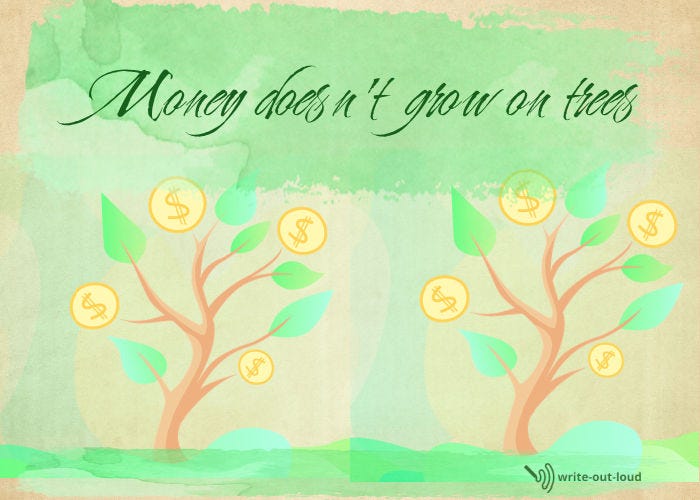If you're at all ordinary, like me, you'll know about comfort food. You may, like me, indulge occasionally. But what about comfort language?
These are the words and phrases you don't have to work hard for. They're just there, always ready for action.
Give them half a chance and they'll take you the whole nine yards. Quick as a flash. In next to no time at all.
These, of course, are cliches and despite their shortcomings, I like them. For some their familiarity may breed contempt but to me, their comfort is enduring, principally because they never leave you stuck for words.
Whatever the topic or situation you'll always have something to say. A person dies and 'they have gone on before'. Someone is ill and 'they're as sick as a dog'.
Having difficult time making a decision? Maybe you're 'caught between a rock and a hard place'. Where would business be without 'the bar being raised' or the 'need to think outside the box'? Then there's a 'paradigm shift', 'it is time for a change', and 'core values'. 'When the going gets tough, the tough get going' and we 'give 110%'.
A good cliche is a one-size-fits-all solution to the challenge of having to think of something original. They're comfortable, like old friends. We know them and everyone else does too. And because they're familiar, we don't have to explain what we're talking about. Everybody 'gets it'.
But what do we actually get?
Cliches carry collective experience rather than specific. They are the embodiment of generalized wisdom housed in words and phrases worn smooth by time and habitual use.
Phrases like 'love is blind' or 'money doesn't grow on trees' alert us to a stereotypical emotional state or situation but they don't tell us anything more. The particulars we don't get. One-size-fits-all language denies that possibility.
The general agreement amongst wordsmiths, speech writers included, is that cliches are a lazy person's substitute for having to think and find meaningful alternatives.
The argument goes, these phrases are wrung dry of any juicy vibrancy. They are empty husks, limp rags. Time and overuse have bleached them bland. Their presence then, is a sign of carelessness and perhaps, limited personal resources: an impoverished vocabulary and a lack of imagination.
What do you think? Is there a place for comfort language?
There is most definitely one for comfort food. We all know the pleasure of relaxing without effort over a meal so familiar in taste, texture and appearance that we don't have to think about. It just is. It is what it was when we first met it and it is the same now. Eating it doesn't challenge us. Its qualities are known and reassuring.
Similarly, I think there's a place for cliche.
I'm not advocating abandoning attempts to use original expressions. I love tailored language: words crafted to precisely fit their speaker's needs, but I also recognize the considerable effort involved. My point? A cliche, (or two or three), can be a welcome rest from the ongoing tussle to find authentic and fresh ways to express ideas which in themselves are not new.
Let's put this in context so you 'know where I'm coming from', 'to make sure we're both singing from the same song sheet'.
For example, 'comfort food' is not appropriate in all situations. If I go to a fancy restaurant expecting a gourmet delight and get served something very ordinary, something I could get anywhere at a fraction of the price, I would be disappointed. When I go to that type of establishment, I expect originality; the chef to have imaginatively combined ingredients to serve a dish with flair.
The same principle applies to the words we use. Comfort language or cliche has its rightful place but it's not in duping yourself or an audience that you've given them something unique or original to mull over.
So where and when are cliches acceptable?
Ultimately that's something you'll have to decide for yourself. The rule I use for myself is that I must be consciously aware of my word choices and the possible effect they may have. It's a 'lofty ideal' and I frequently stumble.
That aside, I like cliches and enjoy the fun I can have them. When I'm not in front of formal audiences there is something deliciously relaxing about sliding into the equivalent of fluffy slipper language to slip-slop around for a bit.
What do you think?
Let us have your tuppence (two cents) worth on the subject.
Looking forward to hearing from you in the comments below.
Until next time,
Go well. Stay well.
Susan
PS. If you found this useful, feel free to share it and click the ❤️ button so more people can discover it on Substack. 🙏Thank you.




Sometimes cliches hit the nail on the head.
I agree with your thoughts here, entirely. And essentially use language the same way as you. Trying for the creative, yet resorting to the "comfort" of cliche when it really does bring in the point most efficiently.
Why not use them on the occasion they hone right in to where you're going? And then from there you can expand as needed.